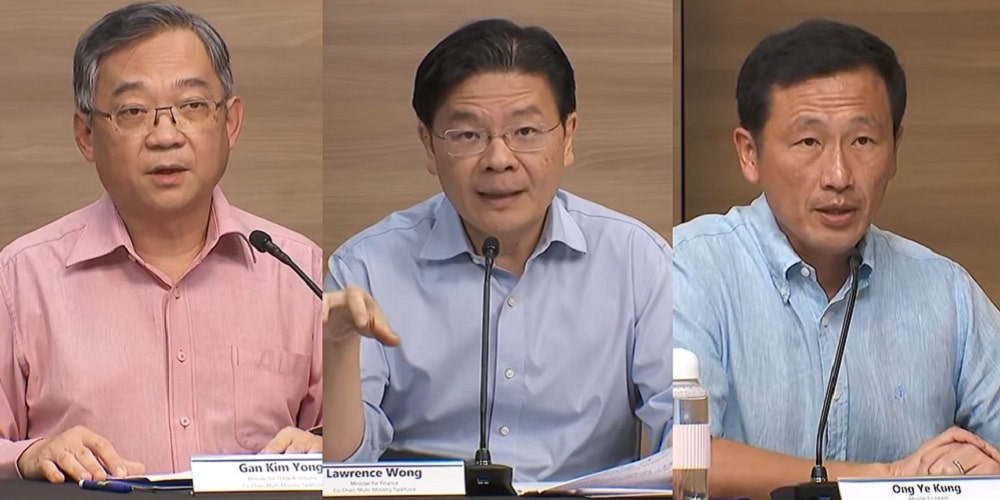The co-chairs of Singapore’s COVID-19 multi-ministry task force on Thursday (24 June) outlined broad plans for the nation’s transition to the new normal, highlighting the possibilities of “living normally” with the COVID-19 in the midst, such as allowing infected persons to recover at home and large gatherings to resume.
In an opinion article published by The Straits Times, Minister for Trade and Industry Gan Kim Yong, Finance Minister Lawrence Wong, and Health Minister Ong Ye Kung noted that they are “drawing up a road map” for the country’s transition to the new normal.
“With vaccination, testing, treatment and social responsibility, it may mean that in the near future, when someone gets COVID-19, our response can be very different from now,” the ministers wrote.
In the new normal, infected people can recover at home, because with vaccination the symptoms will be “mostly mild”, said the co-chairs.
“With others around the infected person also vaccinated, the risk of transmission will be low. We will worry less about the healthcare system being overwhelmed,” they added.
Massive contact tracing and quarantine may not be necessary “each time we discover an infection”, as people can get themselves tested regularly using “a variety of fast and easy tests”.
They noted that people can confirm with a PCR test and isolate themselves if their testing result comes out positive.
Instead of monitoring the COVID-19 infection numbers on a daily basis, the ministers noted that the focus will be on the outcomes – such as how many fall very sick, how many in the intensive care unit, how many need to be intubated for oxygen.
“This is like how we now monitor influenza,” they asserted.
Singapore can progressively ease safe management rules and resume large gatherings, as well as major events, like the National Day Parade or New Year’s countdown, said the ministers, adding that businesses will also not have to worry about disruptions.
Under the new norm, people will be allowed to travel to countries that have controlled the virus, with vaccination certificates in hand.
Travellers, especially those vaccinated, may even be exempted from quarantine order with a negative test upon arrival, said the ministers.
“We are drawing up a road map to transit to this new normal, in tandem with the achievement of our vaccination milestones, though we know the battle against COVID-19 will continue to be fraught with uncertainty.
“In the meantime, we still need to take the necessary precautions and safeguards, to keep infections and hospitalisations at bay,” they added.
Vaccination can help “tame COVID-19”
According to the co-chairs, the Government’s next milestone would be having at least two-thirds of Singapore’s population fully vaccinated “around National Day”.
They noted that the task force is working to bring forward the delivery of vaccines and to speed up the process.
The ministers went on to cite Israel’s experience, which showed that the infection rate among vaccinated persons is 30 times less than that of the unvaccinated, and the hospitalisation rate for the vaccinated is also lower by 10 times.
In Singapore, of the 120 plus fully vaccinated individuals who were infected with COVID-19, including some aged above 65 – and were not resident at hospitals or nursing homes – all had either no or mild symptoms, said the ministers.
In comparison, about 8 per cent of the unvaccinated developed serious symptoms.
“To sustain a high level of protection, and to defend against new mutant strains resistant to current vaccines, booster shots may be needed in the future. We may have to sustain a comprehensive, multi-year vaccination programme.
“Early evidence suggests that with vaccination, we can tame COVID-19,” they remarked.
COVID-19 testing will be “less of a tool for ring-fencing”
While rigorous testing will still be needed at Singapore’s borders to identify any person carrying the virus, domestically, testing will be less of a tool for ring-fencing and quarantining people exposed to infected persons, said the ministers.
They noted that testing would instead focus on ensuring events, social activities and overseas trips can take place safely, as well as to reduce transmission risks, especially to those who are vulnerable to infections.
To make COVID-19 testing fast and easy, the task force has rolled out antigen rapid tests, including self-tests, to polyclinics, private clinics, employers, premises owners and pharmacies.
“There are even faster test kits in the pipeline, such as breathalysers, that take about one to two minutes to produce the results and do not involve swabbing,” they added.
The ministers noted that the airport, seaport, office buildings, malls, hospitals and educational institutions will eventually be able to use these kits to screen staff and visitors.
Apart from that, wastewater testing is also available to find out if there are hidden infections in dormitories, hostels or housing estates.
Govt to improve treatments for COVID-19
The ministers also shared that Singapore’s medical researchers are actively participating in the development of new treatments for COVID-19.
The Ministry of Health (MOH) is tracking the developments of therapeutic agents closely – which are used to treat the critically ill, quickening recovery, and reduce the progression, severity and mortality of the disease – ensuring that the country has adequate supplies of drugs.
Nevertheless, the co-chairs stressed that social responsibility remains critical in the country’s transition to the new norm.
“If all of us practise good personal hygiene, we are less likely to be infected. If all of us are considerate to one another, staying away from crowds when we feel unwell, we will reduce transmission.
“If all of us shoulder the burden together – workers keeping their colleagues safe by staying at home when ill, and employers not faulting them – our society will be so much safer,” they added.







